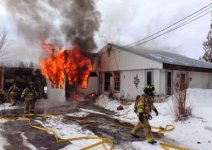Back in 2014 on this very day at 1 pm my house caught on fire. Although it didn't burn to the ground we lost 99% of everything. Due to insurance purposes I had to spend the night in my shed wrapped up in two sleeping bags that managed to survive and then the nightmare began. In the following nine months or so of the rebuild the biggest headache became insurance and inventory of everything we owned. Don't get me wrong, the insurance co. was great but inventory wasn't. Here's an example, how many hangers do you have in your closets? They count towards being reimbursed. The biggest mistake we made was not making a list and taking pictures of what we owned and having it in a secure spot before the fire. We now do.
I know this is way OT but it really is something to think about. Although it is a major project to walk around your abode and document everything it is well worth the effort in the event of a major event. You will be amazed at how much money is involved with replacing stuff, you probably don't think about it but 50+ years, for me, of accumulating items adds up. I would encourage all to spend some time for some personal insurance down the road just in case. Just food for thought on this anniversary day for me.
Here's a link to pics of what a one hour fire can do:
http://photos.google.com/album/AF1QipOKmtW2gNgwwK5yFgHDI7J_rqhW53uq_bmWnhTx
I know this is way OT but it really is something to think about. Although it is a major project to walk around your abode and document everything it is well worth the effort in the event of a major event. You will be amazed at how much money is involved with replacing stuff, you probably don't think about it but 50+ years, for me, of accumulating items adds up. I would encourage all to spend some time for some personal insurance down the road just in case. Just food for thought on this anniversary day for me.
Here's a link to pics of what a one hour fire can do:
http://photos.google.com/album/AF1QipOKmtW2gNgwwK5yFgHDI7J_rqhW53uq_bmWnhTx

